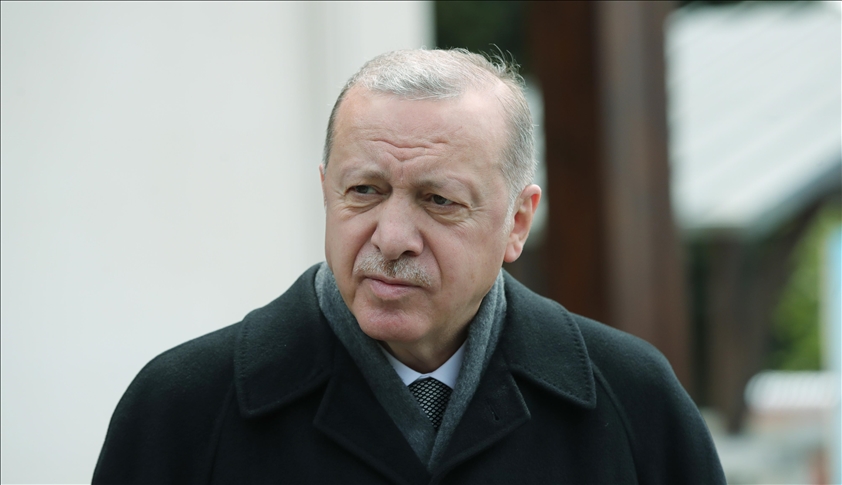'Athens has no right to appoint Muslims' chief mufti'
Athens doesn't pay 'necessary care' for citizenship of 150,000 Turks in Greece, says Turkish President Recep Tayyip Erdogan

ANKARA
Athens has "no right" to appoint the chief Islamic cleric, or mufti, of Muslims living in Greece according to the Treaty of Lausanne, Turkey's president said on Friday.
"How can you do that? We don't appoint the patriarch," Recep Tayyip Erdogan told reporters in the metropolis Istanbul, adding that the Ecumenical patriarch in Turkey is elected by the Holy Synod, the decision-making body of the Greek Orthodox Patriarchate.
Erdogan said Greece does not pay the "necessary care" for the citizenship of the 150,000 Turks living in Western Thrace, most of whom are Muslim.
He stressed that only officials of this group, such as muftis and imams, could choose a chief mufti in Greece.
"However, unfortunately, Greece can't tolerate this and doesn't give such authority to our (Turks in Western Trace) muftis and imams there, and is going to appoint them as if they were its own civil servants as if they were its own religious officials," he said.
The election of muftis is regulated by the 1913 Treaty of Athens, a Greek-Ottoman pact that was implemented by Athens in 1920.
But in 1991, in violation of international law, Greece annulled its law regarding the treaty and unlawfully started to appoint muftis.
The muftis appointed by Greece have since usurped local Muslims’ right of jurisdiction on family and inheritance matters.
The majority of Muslim Turks in Western Thrace do not recognize muftis appointed by Greece and instead rightfully elect their muftis.
Greece, however, has refused to recognize elected muftis since 1991 and authorities have placed some clerics on trial.
Unacceptable accusations
On a joint press conference on Thursday between Turkey and Greece's top diplomats, Erdogan also said Turkey's Foreign Minister Mevlut Cavusoglu rebuked his Greek counterpart Nikos Dendias for unacceptable accusations against Turkey.
In a joint news conference with Dendias on Thursday, Cavusoglu said faits accomplis and provocative rhetoric should be avoided in relations between the two countries.
"We wanted this first meeting to continue in a more positive atmosphere, but in his remarks, Nikos Dendias, unfortunately, made extremely unacceptable accusations against my country," Cavusoglu said.
He said the claim that Turkey violated Greece's sovereignty rights was unacceptable, adding: "Turkey is capable of protecting its rights, especially in the Eastern Mediterranean, and the rights of Turkish Cypriots."
Turkey, which has the longest continental coastline in the Eastern Mediterranean, has rejected maritime boundary claims by Greece and the Greek Cypriot administration, stressing that their excessive claims violate the sovereign rights of Turkey and the Turkish Cypriots.
Last year, Ankara sent out several drillships to explore energy in the Eastern Mediterranean, asserting its rights in the region as well as those of the Turkish Republic of Northern Cyprus.
Turkish leaders have repeatedly stressed that Ankara is in favor of resolving outstanding problems in the region through international law, good neighborly relations, dialogue, and negotiations.
Recent attack on Gaza
Speaking on the latest Israeli attack on the Gaza Strip, Erdogan said the was a "clear indication" of Israel's "attitude towards Muslims."
"Israel's attitude makes it impossible for Turkey-Israel relations to reach the desired level," he added.
On Thursday, the Israeli army claimed that its warplanes and helicopters conducted airstrikes that hit targets belonging to the Palestinian resistance group Hamas, an ammunition factory, and a tunnel used for weapons shipments in Gaza.
No casualties were reported in the attack, according to an Anadolu Agency reporter in the field.
The densely populated Gaza Strip has been under an Egyptian-Israeli blockade since 2007 when Hamas took over the coastal enclave.
The blockade has since undermined living conditions in the region.
More than 2,160 Palestinians were killed, most of them civilians, and some 11,000 injured in an Israeli onslaught against the Gaza Strip in 2014.
Canal Istanbul mega-project
Turkey will "take the first step" in June on one of the bridges envisaged to span Canal Istanbul, a mega-project planned to connect the Sea of Marmara and the Black Sea in the northwest of the country, Erdogan said.
"There are six bridges planned for the first phase. This could also be seven. Currently, these steps have been taken in project design, he added.
On Wednesday, Erdogan had emphasized that Canal Istanbul will result in greater peace of mind for the Turkish nation.
"The Canal Istanbul project, which has nothing to do with the Montreux Convention, will bring Turkey greater comfort and peace," said Erdogan, referring to a 1936 agreement on the Turkish Straits, one of which -- the Bosporus -- is also located in the Istanbul province.
With the Canal Istanbul project, the city will gain much wealth, and the Bosporus will be relieved amid environmental concerns on the current level of marine traffic through the waterway.
The president had previously argued that as an alternate to the Bosporus, the canal would relieve dangerously heavy ship traffic in the straits, and in particular shipments of hazardous materials.
Ban on Quran courses in Northern Cyprus
On the closure of Quran courses in Northern Cyprus, Erdogan said the head of the top court in the country must quickly amend the "mistake," adding that: "Otherwise, the steps we will take will be different in the next course, and they should know this as well."
Referring to a recent ruling by the Constitutional Court on the closure of Quran courses in the Turkish Republic of Northern Cyprus (TRNC), Erdogan said the statement made by the court's head was "unacceptable."
"Secularism is not as they understand it, and Northern Cyprus is not France," he said.
Earlier, Turkey’s Communications Director Fahrettin Altun on Twitter said that the decision on the closure of Quran courses in the TRNC was "the product of an ideological and dogmatic mind."
"To the interpretation of secularism in such a shallow and incorrect way is a step towards abolishing fundamental rights and freedoms," he added.








